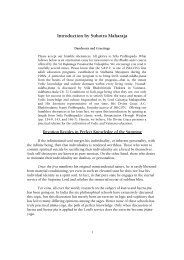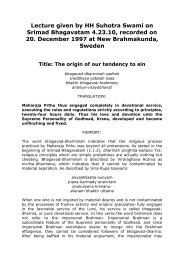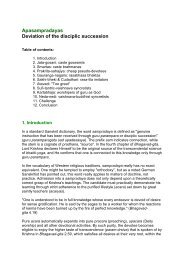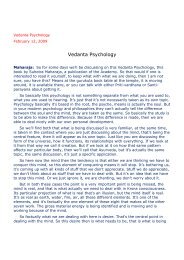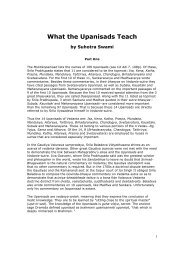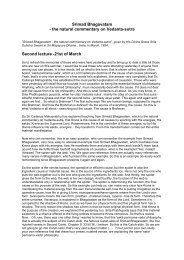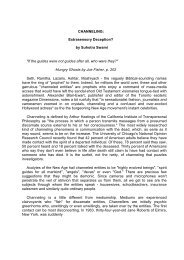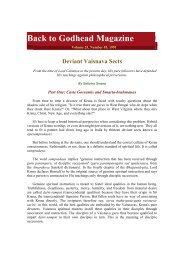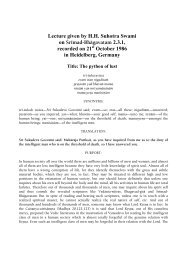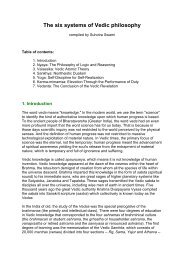Danda 1995 - Suhotra Maharaja Archives
Danda 1995 - Suhotra Maharaja Archives
Danda 1995 - Suhotra Maharaja Archives
- No tags were found...
You also want an ePaper? Increase the reach of your titles
YUMPU automatically turns print PDFs into web optimized ePapers that Google loves.
1. The self-realization stage just after liberation from materiál bondageis called the santa, or neutral stage.2. After that, when there is development of transcendental knowledge of theLord's internal opulences, the devotee engages himself in the dasya stage.3. By further development of the dasya stage, a respectful fraternity withthe Lord develops, and above that a feeling of friendship on equal terms becomesmanifest. Both these stages are called sakhya stage, or devotional service infriendship.4. Above this is the stage of paternal affection toward the Lord, and thisis called the vatsalya stage.5. And above this is the stage of conjugal love, and this stage is calledthe highest stage of love of God, although there is no difference in quality inany of the above stages. The last stage of conjugal love of God is called themadhurya stage. [End of quote]So dasya-rasa means the mood of servitude manifested on the liberated platform.This is nicely explained by Srila Prabhupada in the first chapter of theTeachings of Lord Caitanya."If one can fix his mind on Krsna without deviation, he can attain a steadfastposition in Krsna consciousness, santa-rasa. When one attains santa-rasa,unflinching faith in Krsna is established, and all material desires cease. Thesespecific characteristics of santa-rasa--unflinching faith in Krsna and cessationof all desires which are not connected with Krsna--are common to all other rasasas well, just as sound is generally present in all other elements (air, fire,water and earth) because it is produced from the sky. Similarly, these twocharacteristics of santa-rasa are present in other transcendental relationships,such as dasya (servitorship), sakhya (fraternity), vatsalya (paternalaffection), and the madhura-rasa (conjugal love)."Until the mind is fixed on Krsna without deviation, until there is unflinchingfaith, until all material desires have vanished, a devotee cannot really be saidto have attained dasya-rasa, or any rasa—because he has no taste. But everyliving entity is a servant of Krsna at all times. At the stage of vaidhisadhanabhakti, this constitutional servitude is cultivated by following theregulative principles. When the devotee's transcendental taste awakens andbecomes steady, rasa can then begin.FIRE-BALLQuestion from Mahakirti dasFebruary 5, <strong>1995</strong>Dear <strong>Maharaja</strong>,' " The mystery of FIRE-BALL is definitively resolved " claims boldly Prof.Joshiko Ohcuki from Tokio. Prof. Ohcuki is now travelling with his smalllaboratory all arround the Japan and showing what nobody had seen until now.Before the eyes of interested public and reporters he is manufacturing withinglass tube small samples of FIRE-BALLS.'This is head of the text from one article published in Czech famous magazin.Fortunately cheating bussines of this Prof. is so obvious that even writer ofthis article refused his childish effort played with 5kW mikrowave generator.Please <strong>Maharaja</strong> can you give some sastric evidence or explanation of thephenomenon which we call FIRE-BALL. Personaly I am interested about this




